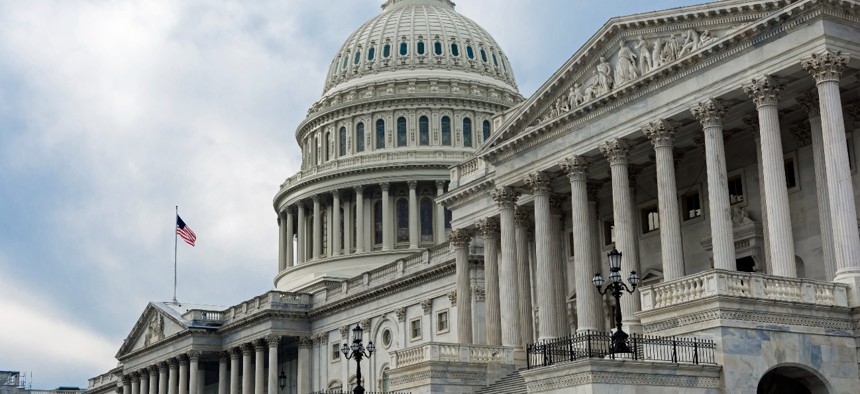
Such disagreements are not uncommon at this stage of negotiations, senators say. Mikhail Makarov / iStock / Getty Images
Senate remains divided along party lines as it kicks off the fiscal 2024 funding process
Despite a budget deal and calls for bipartisanship, a fall shutdown remains possible amid disagreements on appropriations levels.
Despite a budget agreement setting overall funding for fiscal 2024 and repeated bipartisan statements from key leaders, a Senate committee on Thursday advanced specific spending levels for the coming year only along partisan lines.
The disagreement is a significant setback for the appropriations process, as the Senate will ultimately require 60 votes—meaning bipartisan support—to advance spending bills and avoid a shutdown this fall. Lawmakers on both sides acknowledged the hitch, but expressed optimism they can ultimately come together on an agreement.
The Senate Appropriations Committee took a vote Thursday on the allocations for each of the 12 funding bills Congress must pass annually to keep agencies operational, but only Democrats supported it. The Fiscal Responsibility Act that President Biden signed into law earlier this month after tense negotiations with House Republicans set the top-line funding level for defense at $886 billion and non-defense discretionary spending at $704 billion—though pre-agreed to adjustments will grow the latter number—but lawmakers must still determine how that money will be divided among the 12 bills and for each federal agency. Sen. Patty Murray, D-Wash, who chairs the panel, and Sen. Susan Collins, R-Maine, who serves as its ranking member, had previously said they hoped to move in a bipartisan fashion and the agreement on the top level advanced that optimism, but all Republicans voted against Murray’s proposed allocations.
Collins cited the funding levels for the Defense and Homeland Security departments as driving her opposition. Murray’s proposal would cut DHS spending, Collins said, “limiting our ability to have sufficient personnel and technology at the southern border.”
She added that she “did not play a role” in the drafting of the allocations, though she added the lack of a “collaborative process” was not atypical for this stage. Sen. John Kennedy, R-La., expressed disappointment in the process, saying he “thought we were going to have a new day.”
Murray said she was not happy with the allocations either, but the debt limit deal created “challenging top lines” that will “limit our ability to make necessary investments in our country's future.”
“We have a critical job as appropriators and as members of Congress, and I'm determined to get this done,” Murray said. “The way we make the best of what we have to work with is by pushing forward and writing serious bills that can be signed into law and then passing the strongest possible bills in a timely, bipartisan way to keep our government running smoothly and avoid an automatic across-the-board cut to everything.”
As part of the Fiscal Responsibility Act, agencies will incur an across-the-board 1% cut on Jan. 1 if Congress has not yet passed the 12 annual funding measures.
Collins echoed that the Senate must move forward to prevent being faced with a choice between a “catch-all, gigantic omnibus appropriations bill, a government shutdown or a full-year continuing resolution.” She said that she and Murray agreed the proposed allocations were “not the final story” for fiscal 2024 spending.
“I hope that in the weeks ahead we will be able to reach an agreement to ensure that our military and the Department of Homeland Security have the resources they need to keep our country safe,” Collins said.
Sen. Jon Tester, D-Mont., similarly suggested there would be wiggle room on spending in the months ahead.
“I don't think this is going to be the last bite at this appropriations apple, myself,” Tester said. “I think there's going to be other bites coming down the line.”
While Murray’s proposals conform to the Fiscal Responsibility Act, the House has moved forward with spending bills far below the totals agreed to by Biden and House Speaker Kevin McCarthy, R-Calif. Democrats accused Republicans of torpedoing the just-passed deal and surrendering any leverage Republicans will have in future spending negotiations with the Senate. The approach will “all but guarantee a shutdown in October,” Rep. Rosa DeLauro, the top Democratic appropriator, said last week.
Despite the initial disagreements in the Senate, Collins said the committee got off to a “terrific beginning.” The panel on Thursday did win bipartisan support for two of its spending bills, those funding the departments of Veterans Affairs and Agriculture.
“I realize there are difficult days ahead,” Collins said. “But I think all of us can be motivated by a joint desire to avoid a 4,000-page plus omnibus after the fiscal year has already started, as well as our desire to avoid triggering an indiscriminate, extremely harmful, meat ax 1% cut in the allocations that were agreed to in the debt limit bill.”
NEXT STORY: Contractor pay is a government issue







